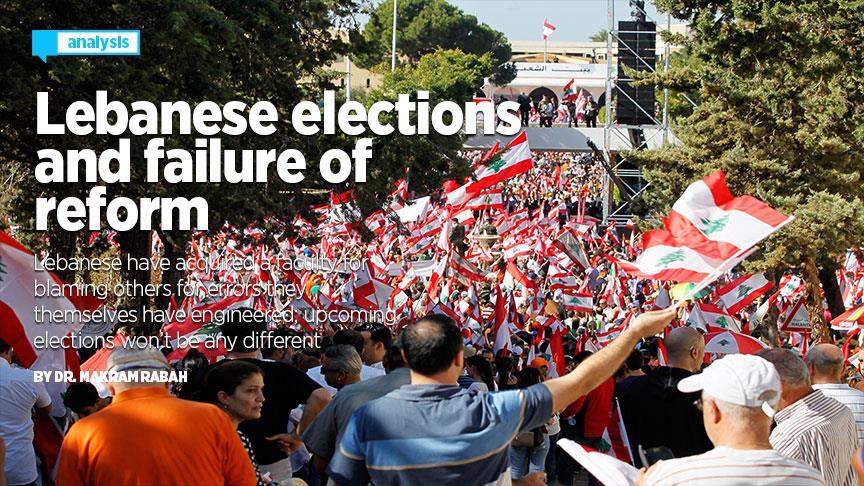Lebanese elections and failure of reform
Lebanese have acquired a faculty for blaming others for errors they themselves have engineered; upcoming elections won’t be any different

By Dr. Makram Rabah
- The writer is a history lecturer at the American University of Beirut. He is the author of 'A Campus at War: Student Politics at the American University of Beirut, 1967-1975'
LEBANON
Nine years have lapsed since the Lebanese cast their votes in the parliamentary elections, which usually come every four years. Having failed to elect a president to replace the outgoing Michel Suleiman in May of 2014, the current parliament, in a blatant breach of the Lebanese constitution, extended its term on three occasions, thereby depriving the Lebanese, as well as a generation of first-time voters, of their inalienable right to choose their representatives.
Yet as the Lebanese head to the polls on May 6, one would be mistaken to look towards this affair as an opportunity for radical change, one that would bring about the end of Lebanon’s archaic and corrupt political system. Over the past, forces of change often looked towards electoral reform as a vehicle to challenge and potentially dethrone the ruling political elite, many of whom have been holding office for over three decades. However, under the new electoral proportional system that require a somewhat high electoral threshold -- the primary vote required to attain a seat --, the only parties to benefit from this setup will be conventional parties with their vast sectarian base.
Despite the aforementioned obstacles, the real barrier preventing the Lebanese political system from transitioning into the realms of good governance, are the Lebanese themselves, who, despite their constant and palpable objection towards the hegemony of the ruling class, always end up voting them back to office. In a recent nationwide poll conducted with 1,200 people, over 77 percent of the Lebanese declared that they saw the country going in the wrong direction, while 80 percent voiced their disproval of the current performance of the parliament.
Be that as it may, many of these disgruntled potential voters will line up on the day of elections and cast their vote for whoever safeguards their sectarian clientelist portion of the state resources and thus perceive this vicious cycle of corruption and spiral economic downfall. The majority of the electorate are fully aware that many of the promises of reform and development projects that these candidates are promoting are unrealistic and worthless, yet they will not hesitate to reelect them.
Realistically, while the voting patterns of these voters might come across as being irrational, when viewed through the lens of Lebanese politics, they do indeed make perfect sense. The Lebanese at large celebrate and honor the image of the strong leader and politicians rather than that of a lawmaker or statesman that cherishes and abides by the rule of law.
It is no coincidence that, 16 members of the Lebanese cabinet, including Prime Minister Saad Hariri, are running for office and none of these public officials feel the urge or the decency to refrain from using their status and resources to campaign for votes, thus violating the sacred principle of the neutrality of the state vis-a-vis the election process. Ironically, none of the Lebanese taxpayers deems it ludicrous for their prime minister to tour various parts of Lebanon using his Lebanese government security detail and his office’s resources to reach out to his electorate. In his position he might be constantly at a serious security risk, yet this does not justify his taking these extra-governmental sorties, which at the end of the day benefit his own party rather than the Lebanese at large.
This abuse of power coincidentally is not limited to Hariri, nor his political bloc. Equally, Gibran Bassil, Lebanon’s foreign minister and son-in-law of President Michel Aoun, has been accused of using the state’s resources to lobby the expats as well as transform some of Lebanon’s embassies around the world into virtual hubs for his party, the Free Patriotic Movement. Such infringements, obscene as they may seem, are to the majority of the Lebanese acceptable, not to say normal, making the matter of accountability even more elusive in the Lebanese case.
As election season rolls around, much talk includes vote buying by various political parties, usually bankrolled by the many nouveau riche businessmen aspiring to buy their way into the parliament. While this tradition of buying votes has historically been part and parcel of the election game, what is novel is the phenomenon of vote selling, which the Lebanese have embraced, and which, in some instances, is insouciantly and publicly flaunted. This vote selling does not always include cash transactions but can also come in the form of providing employment or future favors, as the elector reminds the contenders of the number of voters in his immediate and extended family and the repercussions of failing to meet their demands.
The Lebanese over the years have acquired a faculty for blaming others for errors they themselves have engineered and premeditatedly carried out, and the upcoming elections will not be any different. When all is said and done, once the final votes have been tallied, and the current lawmakers reelected, the Lebanese will have no one to blame but themselves.
*Opinions expressed in this piece are the author's own and do not necessarily reflect the editorial policy of Anadolu Agency Anadolu Agency website contains only a portion of the news stories offered to subscribers in the AA News Broadcasting System (HAS), and in summarized form. Please contact us for subscription options.







